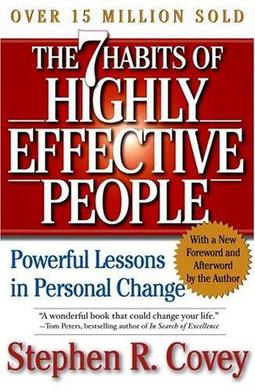The 7 Habits of Highly Effective People
The 7 Habits of Highly Effective People is a self-help book written by Stephen Covey and first published in 1989. It has sold more than 25 million copies worldwide and has been translated into 40 languages. The book outlines a principle-centered approach for solving personal and professional problems. Covey presents an approach to being effective in attaining goals by aligning oneself to what he calls "true north" principles based on a character ethic that he presents as universal and timeless.
Overview[edit | edit source]
Covey's book proposes that effectiveness in living comes from the alignment of one's actions and values with universal and timeless principles. He suggests that the way to achieve this alignment is through the cultivation of habits that lead to character and personal effectiveness. The book is structured around these habits, which are divided into three categories: independence or self-mastery, interdependence, and continuous improvement.
The Habits[edit | edit source]
The seven habits Covey describes are:
- Be Proactive: This habit emphasizes the importance of taking responsibility for one's own life. Covey discusses the concept of Circle of Influence and Circle of Concern, encouraging individuals to focus their energies on things they can actually change.
- Begin with the End in Mind: This habit involves setting long-term goals based on personal values and mission statements, ensuring that one's daily actions align with these goals.
- Put First Things First: Covey introduces a time management matrix for prioritizing tasks based on urgency and importance, suggesting that effective people focus on non-urgent and important activities.
- Think Win-Win: This habit encourages individuals to seek mutually beneficial solutions or agreements in their interactions with others.
- Seek First to Understand, Then to Be Understood: Covey highlights the importance of empathetic listening to genuinely understand another person's perspective before trying to be understood.
- Synergize: This habit focuses on collaborative teamwork, valuing and leveraging individual differences to create a whole that is greater than the sum of its parts.
- Sharpen the Saw: The final habit emphasizes the importance of self-renewal and continuous improvement in the four areas of life: physical, social/emotional, mental, and spiritual.
Impact and Reception[edit | edit source]
Since its publication, The 7 Habits of Highly Effective People has had a significant impact on both personal development and corporate training. Covey's principles have been applied in various contexts, from leadership workshops to educational curricula. The book's emphasis on principles and character ethics has been praised for its depth and timeless relevance, although some critics have argued that its approach may be overly simplistic or idealistic for complex real-world challenges.
Legacy[edit | edit source]
Stephen Covey's work has spawned a business and a series of books and related materials. The Covey Institute and various training programs continue to teach the habits to personal and corporate clients. Covey also wrote several follow-up books, including The 8th Habit: From Effectiveness to Greatness.
See Also[edit | edit source]
Search WikiMD
Ad.Tired of being Overweight? Try W8MD's physician weight loss program.
Semaglutide (Ozempic / Wegovy and Tirzepatide (Mounjaro / Zepbound) available.
Advertise on WikiMD
|
WikiMD's Wellness Encyclopedia |
| Let Food Be Thy Medicine Medicine Thy Food - Hippocrates |
Translate this page: - East Asian
中文,
日本,
한국어,
South Asian
हिन्दी,
தமிழ்,
తెలుగు,
Urdu,
ಕನ್ನಡ,
Southeast Asian
Indonesian,
Vietnamese,
Thai,
မြန်မာဘာသာ,
বাংলা
European
español,
Deutsch,
français,
Greek,
português do Brasil,
polski,
română,
русский,
Nederlands,
norsk,
svenska,
suomi,
Italian
Middle Eastern & African
عربى,
Turkish,
Persian,
Hebrew,
Afrikaans,
isiZulu,
Kiswahili,
Other
Bulgarian,
Hungarian,
Czech,
Swedish,
മലയാളം,
मराठी,
ਪੰਜਾਬੀ,
ગુજરાતી,
Portuguese,
Ukrainian
Medical Disclaimer: WikiMD is not a substitute for professional medical advice. The information on WikiMD is provided as an information resource only, may be incorrect, outdated or misleading, and is not to be used or relied on for any diagnostic or treatment purposes. Please consult your health care provider before making any healthcare decisions or for guidance about a specific medical condition. WikiMD expressly disclaims responsibility, and shall have no liability, for any damages, loss, injury, or liability whatsoever suffered as a result of your reliance on the information contained in this site. By visiting this site you agree to the foregoing terms and conditions, which may from time to time be changed or supplemented by WikiMD. If you do not agree to the foregoing terms and conditions, you should not enter or use this site. See full disclaimer.
Credits:Most images are courtesy of Wikimedia commons, and templates Wikipedia, licensed under CC BY SA or similar.
Contributors: Prab R. Tumpati, MD

